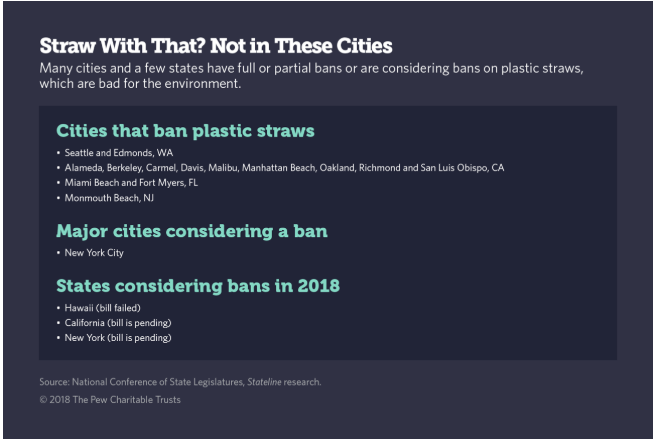Connecting state and local government leaders
Some cities are banning plastic straws, while three state legislatures have debated the issue this year.
This article was originally published by Stateline, an initiative of The Pew Charitable Trusts and was written by Elaine S. Povich.
Hard on the heels of banning plastic bags, states and cities are being pressed by environmentalists to eliminate another consumer convenience—plastic straws. But objections from the plastics industry, restaurants and disability advocates have derailed or delayed some proposed straw bans.
And experts say cutting down on single-use plastic may be more about changing habits than changing laws.
Three states—California, Hawaii and New York—have considered plastic straw legislation in 2018. Hawaii’s died, and the other two are still pending.
Seattle, Miami Beach, Oakland and more than a dozen other cities, about half of them in California, have either banned plastic straws altogether or required customers who want a straw to ask for it. New York City is also considering a ban.

The bans are not frivolous, as plastic has been found in fish, in the bellies of seabirds and in fresh drinking water as well. A viral video of scientists removing a straw from a sea turtle’s nostril has inflamed passions too. But at least one expert in the field of “marine plastic” suggests plastic-straw bans may not make much of a dent in the problem.
Straws are an easy target for environmental change, though, because they’re considered nonessential. Kara Lavender Law, a research professor of oceanography at the Sea Education Association in Woods Hole, Massachusetts, said there’s plenty of evidence that throwaway plastics are getting into the ocean, as cleanup efforts find lots of straws, bottles, bags and food wrappers.
The world’s largest accumulation of trash, dubbed the “Great Pacific Garbage Patch,” is now more than 600,000 square miles, according to a study in the journal Nature.
“Bans on straws are perceived as sort of low-hanging fruit, unnecessary items,” Law said. “Whether a ban is the right way to approach it is arguable. I’m not sure it’s the way we are going to solve the problem, but it’s an indication of the public will and the political will.”
Law and several others wrote a 2017 research paper on plastics for the journal Science Advances, estimating that since the 1960s when consumer plastics started being widely used, approximately 6,300 million metric tons of plastic waste has been generated worldwide. Only 9 percent of that has been recycled, 12 percent incinerated, and the rest of it dumped in landfills or directly into the environment.
Banished From Paradise?
Hawaii seemed like a logical target for plastic-straw bans this year. The state depends on beaches and tourism and touts its pristine coasts, hardly a place where anyone would want to see discarded straws scattered about.
A bill to ban distribution and sale of plastic straws was introduced in January by state Sen. Mike Gabbard, a Democrat, and the legislation sailed through the Agriculture and Environment Committee, which he chairs. It failed to clear the Judiciary and Ways and Means committees, where it was cross-referred.
Objections came from the Hawaii Food Industry Association, the Hawaii Restaurant Association, the Retail Merchants Association and the American Chemistry Council, all of which presented testimony in hearings about the bill.
“We all need to get better at reducing waste and educating the general public in proper disposal of trash, but this bill is not the solution,” the restaurant group’s statement read. “The alternate for plastic straws whether it’s paper or reusable is really not that available. Is the next step banning all disposable utensils?”
Environmental groups such as StrawFree, a Southern California group that is pushing reusable straws made from bamboo, say yes. They note that reusable water bottles are becoming a popular alternative to plastic and suggest that reusable utensils could become popular as well.
The American Chemistry Council also opposes plastic-straw bans and recently suggested that an “opt-in” plan, under which diners must ask for a straw, is a better solution.
“Recycling, source reduction, recovery, and conservation are all tools to help reduce litter/disposal,” senior director Tim Shestek said in an email. “In this particular instance, we think an ‘on demand’ approach makes the most sense.”
Private companies are getting into the act, too. Bon Appetit, a chain of a thousand eateries, recently announced it would ban plastic straws. But McDonald's stockholders voted down a proposal backed by the consumer watchdog group SumOfUs calling for the company to make efforts to “develop and implement substitutes for plastic straws.”
Millions of Straws Served
McDonald’s uses 95 million straws a day in the United States, according to the watchdog group. In opposing the proposal, McDonald’s said it continues to look for “sustainable alternatives for plastic straws globally.” In fact, it is phasing in paper straws in the United Kingdom after the U.K. banned plastic straws.
But McDonald’s urged a “no” vote in the United States, saying in a statement that the proposal was “unnecessary, redundant as to the Company’s current practices and initiatives, and has the potential for a diversion of resources with no corresponding benefit to the Company, our customers and our shareholders.”
Gabbard, the sponsor of the Hawaii plastic-straw ban, said he intends to bring the bill up again in 2019. He thinks strong environmental support may help build more momentum this time. “Opt-in could be considered as a compromise, but my goal at this point would be to go for the ban,” he said. “Although we may have the opt-in as a last resort.”
The New York City plastic-straw ban bill, introduced by Democratic Councilman Rafael Espinal of Brooklyn, had its first hearing this month, picking up support from Democratic Mayor Bill de Blasio’s administration. In an op-ed for the New York Daily News, Espinal and colleagues noted that at least 65 restaurants in the city have signed on to a campaign to do away with plastic straws.
“As New Yorkers, we see the impact of our fast-paced lifestyle in the plastic waste that litters the avenues and subway tracks that crisscross our great city, making its way into waterways and the bellies of turtles, fish and birds in our local seascape,” Espinal wrote. “Plastic straws are a great place to begin turning that trend around.”
Many disability advocates oppose straw bans, noting that alternatives such as paper straws and reusable straws may not work as well for disabled people.
Jessica Denise Grono, of Phoenixville, Pennsylvania, who has cerebral palsy and who blogs as “CP Mommy,” said in an email interview that without a straw, “I’d be forced to have someone pour a drink in my mouth. Only half would go in. A straw gives me a less messy and independent way to drink.” She said she’s not opposed to the opt-in proposals.
California Compromise
In California, the opt-in already has become the fallback position for advocates of a statewide plastic-straw ban. Unlike some of the city ordinances, the bill in the Legislature would provide for straws only on request in sit-down restaurants. It would not apply to takeout-only restaurants, meaning those eateries could continue to hand out straws to all customers.
The bill passed the Assembly in May and was headed for the Senate. It follows in the wake of California banning plastic retail bags in 2014, which was upheld by statewide referendum in 2016.
“I’m not trying to get rid of plastic straws,” insisted Majority Leader Ian Calderon, a Democrat and sponsor of the bill who said he grew up surfing in the Pacific and saw plastic debris there every day.
“I want to help us be a little more responsible with single-use plastics. I want to raise awareness to make sure people are aware of the detrimental effects on our environment.”
But Assemblyman Matthew Harper, a Republican from Orange County, said Calderon’s bill is a smokescreen to eventually “have an outright ban of plastic straws.” He objects to the bill on the grounds that it’s another way for government to try to control behavior.
“I’m for folks being good stewards of the environment, but that doesn’t mean the government has to tell you how to do everything every day,” Harper said in an interview. “It’s ideologically fashionable to be opposed to anything that’s plastic. I represent a coastal district that includes Laguna Beach. I’d like to see more enforcement of litter laws.”
He said those who want to ban plastic straws may have a tough sell with his constituents. “To make that argument to someone in San Bernardino trying to enjoy a chocolate malt — that’s very hard to do without a straw.”

NEXT STORY: Share of Kids Facing Food Insecurity Still Above Pre-Recession Levels



